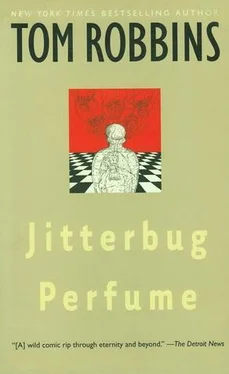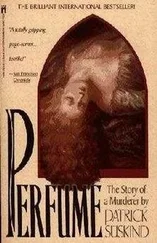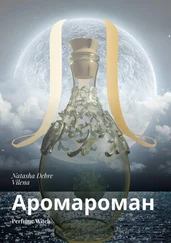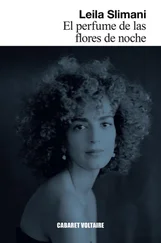Tom Robbins
Jitterbug Perfume
FOR DONNA AND THE WATER MUSIC
And for those whose letters I still
haven't answered.
The distinctive human problem from time immemorial has been the need to spiritualize human life, to lift it onto a special immortal plane, beyond the cycles of life and death that characterize all other organisms.
— ERNEST BECKER
The history of civilization is the story of man's emancipation from a lot that was harsh, brutish, and short. Every step of that upward climb to a sophisticated way of life has been paralleled by a corresponding advance in the art of perfumery.
— ERIC MAPLE
Rage, rage against the dying of the light.
— DYLAN THOMAS
(And) always smell as nice as possible.
— LYNDA BARRY
The author is grateful to his agent and friend, Phoebe Larmore; to his intrepid editor, Alan Rinzler; to Laren Elizabeth Stover, who passed him fragrance-industry secrets in lipsticked envelopes; and to Jessica Maxwell, whose ancestor once owned a perfume shop in New Orleans, and who traded him that shop for a flying conch shell.
THE BEET IS THE MOST INTENSE of vegetables. The radish, admittedly, is more feverish, but the fire of the radish is a cold fire, the fire of discontent not of passion. Tomatoes are lusty enough, yet there runs through tomatoes an undercurrent of frivolity. Beets are deadly serious.
Slavic peoples get their physical characteristics from potatoes, their smoldering inquietude from radishes, their seriousness from beets.
The beet is the melancholy vegetable, the one most willing to suffer. You can't squeeze blood out of a turnip . .
The beet is the murderer returned to the scene of the crime. The beet is what happens when the cherry finishes with the carrot. The beet is the ancient ancestor of the autumn moon, bearded, buried, all but fossilized; the dark green sails of the grounded moon-boat stitched with veins of primordial plasma; the kite string that once connected the moon to the Earth now a muddy whisker drilling desperately for rubies.
The beet was Rasputin's favorite vegetable. You could see it in his eyes.
In Europe there is grown widely a large beet they call the mangel-wurzel . Perhaps it is mangel-wurzel that we see in Rasputin. Certainly there is mangel-wurzel in the music of Wagner, although it is another composer whose name begins, B-e-e-t—.
Of course, there are white beets, beets that ooze sugar water instead of blood, but it is the red beet with which we are concerned; the variety that blushes and swells like a hemorrhoid, a hemorrhoid for which there is no cure. (Actually, there is one remedy: commission a potter to make you a ceramic asshole — and when you aren't sitting on it, you can use it as a bowl for borscht.)
An old Ukrainian proverb warns, “A tale that begins with a beet will end with the devil.”
That is a risk we have to take.
SEATTLE
PRISCILLA LIVED IN A STUDIO APARTMENT. It was called a “studio” apartment because art is supposed to be glamorous and landlords have a vested interest in making us believe that artists prefer to sleep in their workrooms. Real artists almost never live in studio apartments. There isn't enough space, and the light is all wrong. Clerks live in studio apartments. File clerks, shop clerks, law clerks, community college students, elderly widows, and unmarried waitresses such as Priscilla.
The building in which this particular studio apartment donned its false beret was built during the Great Depression. In Seattle there are many such buildings, anointing their bricks in the rain on densely populated hillsides between Lake Washington and Elliott Bay. Architecturally, its plain facade and straight lines echoed the gown Eleanor Roosevelt wore to the inaugural ball, while its interior walls still reproduced faithfully the hues of the split pea mush dished up in hundreds of soup kitchens. Over the years, the building had been so lived in that it had acquired a life of its own. Every toilet bowl gurgled like an Italian tenor with a mouthful of Lavoris, and the refrigerators made noises at night like buffalo grazing.
Most older studio apartments — the ones in those buildings of New Deal brick — harbored odors as definitive as their colors and sounds, odors arrived at through generations of salmon cakes frying and broccoli boiling, but here was where Priscilla's apartment differed. It smelled of chemicals — less mephitic than sweet — and it was that smell that leaped to greet her, like a cooped-up pooch, when she let herself in on a weary midnight.
The first thing she did after switching on the overhead light was to kick off her low-heeled waitress shoes. The second thing she did was to stub a toe on a table leg. The table, at which innumerable widows had sat down to canasta, shuddered paroxysmally, causing beakers of chemicals to rattle and sway. Fortunately, merely a few drops of their contents were lost.
Priscilla flopped on the couch that was also her bed and massaged her feet, devoting special attention to the affronted toe. “Goddamnit,” she said. “I'm such a klutz. I don't deserve to live in this world. I ought to be sent to one of those planets where there isn't any gravity.”
Earlier that evening, at the restaurant, she'd dropped a whole tray of cocktails.
Inside her hose, her feet were as red as newborn mice. Steam seemed to rise from them. Mouse gas. She rubbed her feet until they felt comforted, then she rubbed her eyes. With a sleepy sigh, she let herself topple over on the couch, only to be startled by a shower of silver coins. The evening's tips had cascaded from her pockets and scattered about her head and body, the couch and floor. She watched a dime roll across the worn carpet as if heading for the exit. “Is this what they mean by runaway inflation?” she asked. “Come back here, you coward!”
Sighing again, she arose and gathered the money. The few crumpled bills she stuffed in her purse, the coins she trickled into a dusty fishbowl on the dresser. The bowl was full to overflowing. “Tomorrow I'll open a bank account,” she vowed. She had made that vow before.
She removed her uniform — a blue sailor dress with piping of white and red — and tossed it in a corner. At the bathroom sink in her panty hose and bra, she washed her hair. She felt too tired to wash her hair, but it so reeked of cook grease and cigarette smoke that it competed with the resident smell of the apartment, and that would never do. There was no cap for the shampoo bottle. In fact, she couldn't remember when it — or the toothpaste — had last had a cap. “I could have sworn there was a cap on it when I bought it,” she said.
A number of short, curly hairs were stuck to the cake of soap. They made her wince. The hairs reminded her of an incident at work. She and Ricki usually took their breaks together. They would lock themselves in the employees' washroom and smoke a joint or blow a line of coke. Anything to lighten the load of the trays. Inevitably, Ricki made lewd suggestions. Sometimes, she'd casually lay her hands on Priscilla's body. Priscilla was not really offended. Ricki was one of the few people on the restaurant staff who could read something more intellectually demanding than a menu. Moreover, she was pretty, in a dank, faintly mustachioed way. Perhaps Priscilla was obliquely titillated by Ricki's advances. Usually, she brushed them off in a manner that made them both laugh. On this night, however, when, on the pretext of leveling a molehill that allegedly had bunched up in Priscilla's panty hose, Ricki administered to the back of her upper thigh with lengthy and ever-widening caresses, Priscilla had snapped at her and punched her hard on the arm. At the end of the shift, Priscilla apologized. “I'm just tired,” she told Ricki. “I'm truly goddamned exhausted.” Ricki said that it was okay, but said it in a tone that intimated damage below the waterline of their friendship. Priscilla brooded over this as she plucked several pubes from the soap.
Читать дальше












